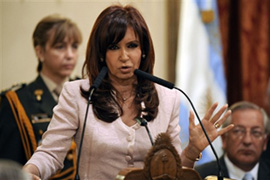Argentina bank chief reinstated
Central bank head returns to post after court rules against president’s sacking order.

Florencio Randazzo, the interior minister, said the government would appeal, arguing that the constitution clearly allows it to issue the emergency decree.
Dismissal reasons
Fernandez’s decree cited misconduct and dereliction of duties as reasons for the dismissal.
“The decision was made because the central bank must keep functioning,” Fernandez said.
Redrado’s spokesman said that even though he had agreed to leave his office, “he will not resign” and will take the case to court.
Redrado maintains that the bank’s charter stipulates he can only be removed by congress.
Fernandez had ordered the central bank to use about $6.6bn in reserves to help cover $13bn in international debt falling due this year.
Opposition legislators and other critics accused Fernandez of violating the bank’s autonomy by ordering it to use reserves to pay the debt, saying it could lead to a sharp increase in government spending.
Bank charter
Aldo Abram, director of the private economic think-tank, the Centre for Investigating Institutions and Markets of Argentina, said the central bank’s original charter establishes its independence.
“That is, it doesn’t take orders from [the executive] nor are its employees part of the government. Therefore, the president cannot seek their resignations,” he said in a statement.
Fernandez’s government argued that since it is ultimately the president’s decision, skipping congressional action and firing Redrado directly was legal.
 |
| The Fernandez government’s popularity could suffer because of the central bank row [AFP] |
“There is no conflict of powers,” Amado Boudou, the economy minister, said.
Al Jazeera’s Terea Bo, in the capital Buenos Aires, said the issue may be troublesome for the government: “This could have big political implications.
“Many people are talking about what happened in the past year when the government tried to increase export taxes on soya beans and farmers took to the roads.
“Then the situation had to be solved in congress where basically the government lost.
“So many here are saying this could happen again.
“And this could greatly damage the government and its image and Kirchner’s approval ratings, which are currently pretty low at about 30 per cent.
“Many people are saying here that the government is authoritarian and that they have tried to pass congress in the past.”
Debt problems
Bo said that it was unclear whether the government would definitely appeal the decision, but if it did the situation would not be resolved until next week or March when congress meets.
Fernandez’s administration says it is trying to clear up the country’s debt problems so that it can return to international credit markets that have been closed to it since a 2001 default on debt payments.
Argentina’s debt obligations rise steeply this year to $13bn, and economists estimate a funding gap of $2bn to $7bn.
Claudio Loser, a senior fellow at the Inter-American dialogue, told Al Jazeera: “The problem is that Argentina … has not dealt after a long period of crisis with its creditors therefore it has to pay enormously high interest rates.
Noting that creditors have shunned Argentina of late, Loser said the government should tighten national spending and improve its international relations to become a member of the financial world “of good standing”.